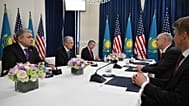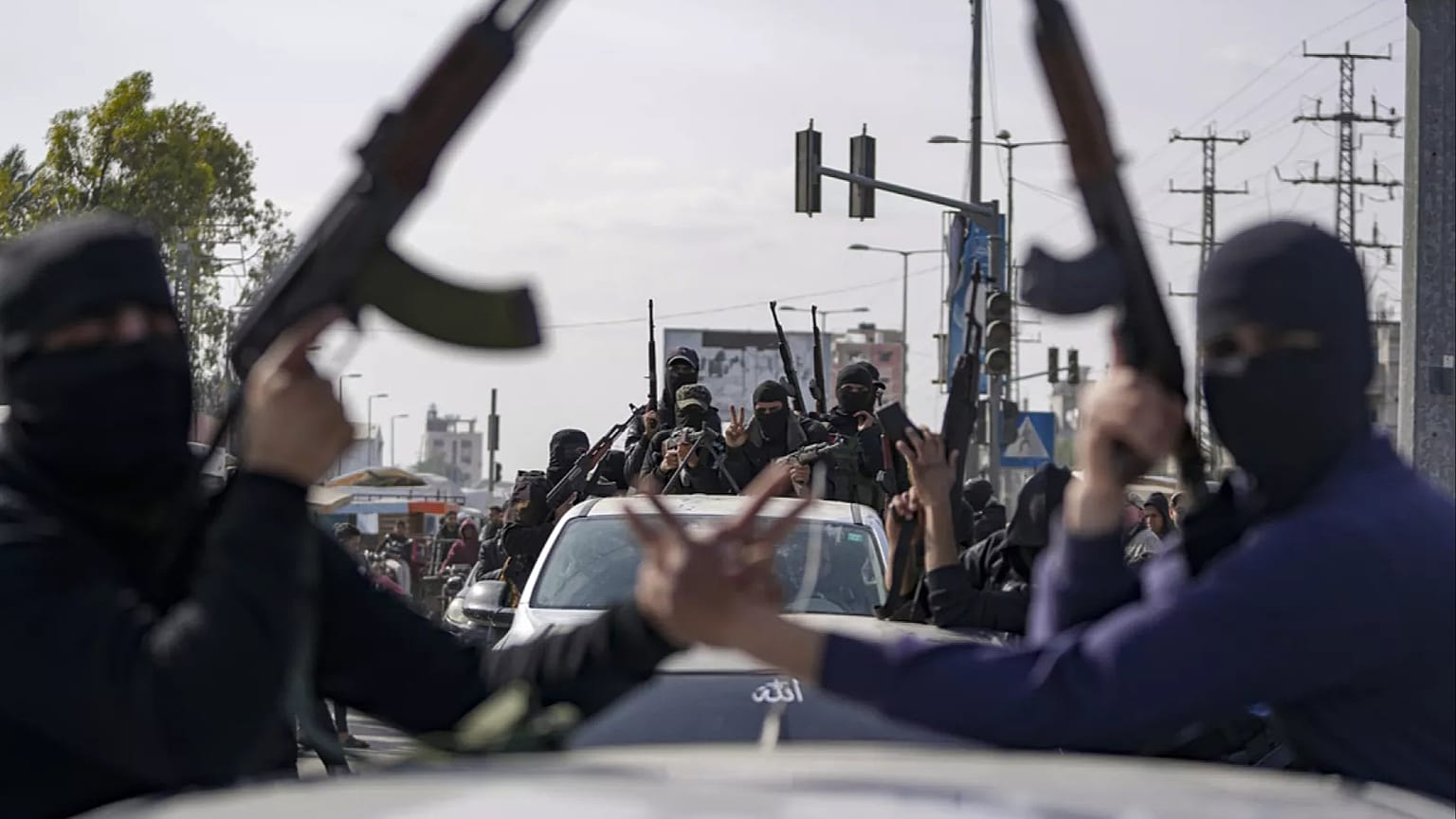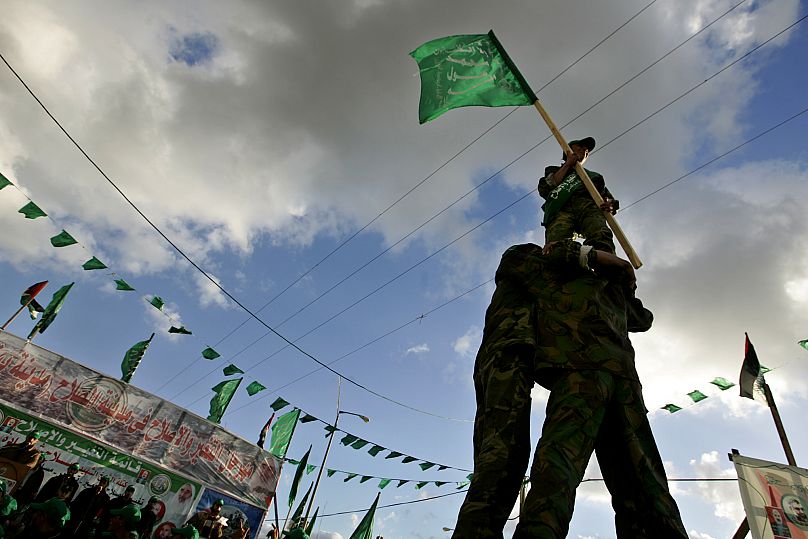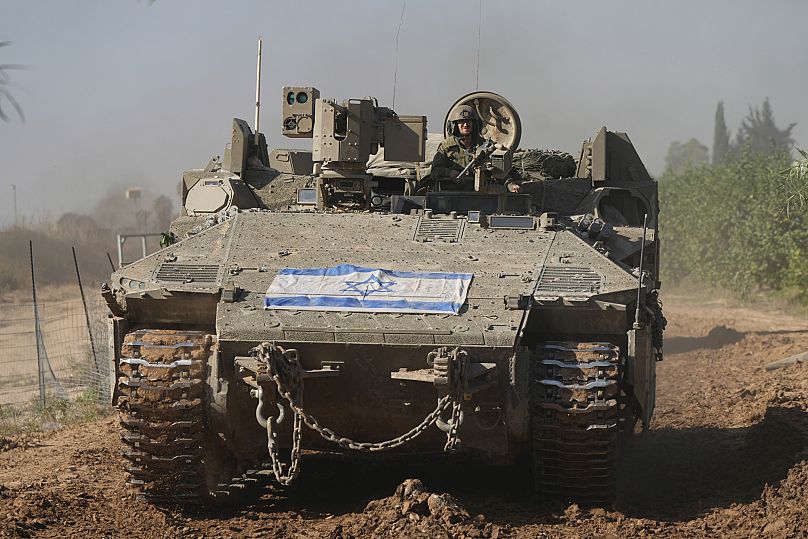Hamas has allegedly requested that Israel free several jailed commanders as peace negotiations are ongoing in Egypt. Who are the people on the list, and why for Israel is this “a red line the negotiating team won’t cross”?
As part of ongoing peace talks, Hamas has demanded from Israel the release of several high-profile militants serving significant prison sentences, including senior Hamas commanders, Israeli security sources told Euronews.
 ADVERTISEMENT
ADVERTISEMENT
 ADVERTISEMENT
ADVERTISEMENT
The sources said that freeing them represents a “red line” for Israel, stating that Hamas “insisting on these names will guarantee war and no deal”.
The list, as seen by Euronews, features four prominent names: Marwan Barghouti, Ahmad Sa'adat, Hassan Salameh and Abbas al-Sayed.
Barghouti is a senior Fatah leader arrested by Israel in 2002 and sentenced to five life terms for murder related to al-Aqsa Martyrs Brigades attacks.
Sa'adat, previously general secretary of the Popular Front for the Liberation of Palestine, was sentenced to 30 years for organising the 2001 assassination of Israeli Tourism Minister Rehavam Ze'evi.
Hassan Salameh is a senior Hamas commander sentenced to 46 life terms for organising 1990s bus bombings in Jerusalem and Tel Aviv that killed dozens of Israelis.
Abbas al-Sayed is a Hamas leader from Tulkarem sentenced to 35 consecutive life terms for masterminding the 2002 Park Hotel bombing in Netanya that killed 39 Israelis and injured 140 others.
Why does Hamas want their release?
Hamas has repeatedly requested the release of these four commanders during the past negotiations with Israel, and these demands were rejected every time.
Each of them represents a high-value individual to the armed group. Sa’adat, as the leader of PFLP, is seen as a symbol of Palestinian resistance from Israeli prison.
Hamas considers Salameh a national hero and symbol of loyalty to veteran fighters, while its request to release al-Sayed shows its intention to demand back even those involved in mass-casualty attacks.
Euronews was able to verify with reliable sources in Palestine that the most important individual on the list for the group is Marwan Barghouti.
Hamas sees him as a valuable ally aligned against Israel, and his release is believed to be important for its long-term influence in Palestinian politics – despite one of the peace deal’s main points being Hamas’ removal from power.
Israeli security sources told Euronews that the demand to release these four individuals is “a red line the negotiating team won’t cross”.
“Demanding these terrorists spells more war and the complete destruction of Gaza,” they said.
Hamas has been insisting during the previous negotiations that the release of these life-sentenced prisoners is a central condition for releasing the hostages it still holds, underscoring their importance in Hamas’ negotiation strategy.
Indirect talks in Egypt
The Israeli government rejected Euronews’ request to comment on Hamas’ demands while the negotiations in Egypt are ongoing.
On Tuesday, government sources told Euronews that Israel remains ”cautiously optimistic about the talks in Egypt,” despite concerns that Hamas "might attempt to manipulate the process”.
“Our position is clear: the immediate release of all 48 hostages, as agreed in President Trump’s plan, is non-negotiable,” they said.
However, Prof Nathan Brown, a Middle Eastern politics expert at George Washington University, told Euronews that it is unlikely all parties have agreed to Trump's plan.
"The United States and other actors are behaving as if all key parties have agreed to the Trump plan. That simply is not the case," Brown told Euronews. "The plan announced was different from the one worked out between the US and key Arab states. Netanyahu made clear immediately afterwards that he rejected a Palestinian state, and that provision was key for the Arab states."
Brown said Hamas has only agreed to ceasefire provisions while "all the rest is still up in the air." "It is only at this point that the serious negotiations are beginning and the parties are still far apart," he added.
Hamas has agreed to release all the remaining Israeli hostages but says it wants further talks on several key points outlined in the US peace plan.
The armed group’s senior official and leader of the negotiating team to Egypt, Khalil al-Hayya, says that Hamas needs “real guarantees” of a lasting ceasefire as part of any deal to return the remaining 48 hostages still under captivity in Gaza, of which 20 are believed to be still alive.
The map shown by the White House includes three proposed stages of Israeli troop withdrawal. The first stage left around 55% of Gaza under Israeli control, the second stage leaves 40% and the final one 15%.
The White House map does not match Israel’s military maps of militarised areas, and most importantly, neither gives a clear timeline for the future withdrawal.
Euronews was able to verify with reliable sources in Palestine that Hamas is more focused on the extent of Israel's withdrawal and the timeline of it, and would most likely be willing to compromise on their demands for the prisoners' release, as it happened in the past negotiations.
Brown said Hamas "wants a ceasefire" and that "a delay does not help them but agreeing on Israeli terms would be a complete surrender."
"The Israeli government is less committed to a deal but they are unwilling to break with the Trump administration," he added. "Most of all they do not want any provision that would inhibit their ability to act unilaterally or to abandon their ability to operate as they like in Gaza."
But what the group is also reportedly concerned about is the future of the remaining Hamas members and their associates if Trump’s plan works out.
In an exclusive interview with Euronews on Sunday, Israeli Prime Minister Benjamin Netanyahu stated that “Hamas’ rule has to come to an end.”
"Now, of course, I can't tell you if Hamas will agree to (the peace deal). I think that it's possible. I hope it will happen, but I can guarantee that it will," Netanyahu said.
"And so if it doesn't happen, what President Trump has said is that he will back Israel completely in acting forcefully against Hamas," he added. "Well, let's hope that we can finish it the easy way and not the hard way."
















